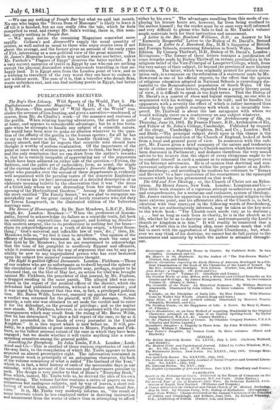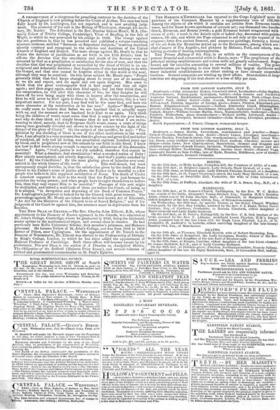My Heart's in the Highlands. By the Author of "The
Nut-Brown Maids." (Parker, Son, and Bourn) Historic Certainties respecting the Early History of America, developed in a Cri-
tical Examination of the Book of the Chronicles of the Land of Ecnart. By
the Rev. Aristarchus Newlight. New Edition. (Parker, Son, and Bourn.) Anne Bokyn: a Tragedy. (W. Kent and Co.) Re-issue of" Punch" Volume IV. (Bradbury and Evans.) The Poetical Works of John Milton, with a Memoir and Critical Remarks on his Genius and Writings. By James Montgomery. New Edition. In two volumes Volume II. (Henry G. Bohn.) The Constable of the Tower. An Historical Romance. By William Harrison Ainsworth. Illustrated by John Gilbert In three volumes. (Chapman and Rail.) The Leighs; or, the Discipline of Daily Life. By Mies Palmer. With Illustra- tions by Walter Ray Woods. (James Hogg and Sons.) Agnes Home. A new and revised edition. Illustrated by Maresco Pearce. (Simpkin, Marshall, and Co.) The Wedding Guests; or, the Happiness of Life. A NoveL By Mary C. Hume. (F. Pitman.) Key to Bindasiani; or, an Easy Method of acquiring Hinddstanf in the Original Character, arranged on the plan of an English Spelling-book. By Hydur Jung Bahadoor, M.R.A.S., Sc. (James Madden.) On the Physical Constitution of Comets. By Olinthus Gregory Downee, F.R.A.S. (Charles and Edwin Layton.) Roseallan's Daughter: a Tragedy in Three Ada. By John leGilchrist. (Edin- burgh: William P. Nimmo.) Paul Fosters Daughter. By Dutton Cook. In three volumes. (Hurst and Blacken.)
SERIALS.
The British Quarterly Review. No, LXVII., July 1, 1861. (Jackson, Watford, and Hodder.) The Medical Critic and Psychological Journal. Edited by Forbes Winslow, M.D., Sc. No. III., July, 1861. (J. W. Davies.) The Westminster Review. New Series. No. XXXIX., July, 1861. (George Man- waring.) New Quarterly Review. No. XXXVIII., July, 1861. The Scottish Review: a quarterly Journal of Social Progress and General Litera- ture. No, XXXV., July, 1861.
The National Review. No. XXV., July. The English Cyclopedia of Arts and Sciences. Part XXX. (Bradbury and Evans.)
PAMPHLETS.
Speech on the Ecclesiastical Courts. Delivered inithe House of Commons on the
lard July, 1860. By Henry Seymour, M.P. for Poole. (John Murray.)
The Second Year of one of England's Little Wars. By Octavius Hadfield, Arch-
deacon of Kapiti, New Zealand. (Williams and Norgate.)
A Charge delivered in the Cathedral and Parish Church of St. Michael, May 16, 1861. By Thomas Parry, D.D., Bishop of Barbadoes. (Inv Danger from Within : Charge delivered at the Annual Visitation of the of Dublin and Glendalagh, and Kildare, June 1861. By Richard , D.D., Archbishop of Dublin. (Parker, Son, and Bourn.) A PROSECUTION of a clergyman for preaching contrary to the doctrine of the Church of England is now pending before the Court of Arches. The case has been
fully heard by Dr. Lushington, but not reported, and is now awaiting judg- ment. The promoter of the suit is the Bishop of Winchester, through his secre- tary, Mr. Burden The defendant is the Rev. Dunbar Isidore Heath, M.A. (for- merly Fellow of Trinity College, Cambridge), Vicar of Brading, in the Isle of Wight, to which he was presented by his college in 1846. The charge against the rev, gentleman is, that he has preached and published a volume containing nineteen sermons, entitled "Sermons on Important Subjects," teaching doctrines directly contrary and repugnant to the articles and doctrines of the United Church of England and Ireland. The main charge against Mr. Heath is, that he denies the doctrine of justification as set forth in the 11th Article; that he affirms the doctrine that the crucifixion and death of the Saviour were not accepted by God as a propitiation or satisfaction for the sins of men, and that the doctrine that God was propitiated or reconciled by the blood of Christ is an un- scriptural and detestable doctrine; • that forgiveness of sins bas nothing to do with the Gospel, and that sins cannot be forgiven either in this world or the next, although they may be remitted. On this latter subject Mr. Heath says: "People generally think that God keeps changing about to every one of us according as we sin and repent, and am again and are again forgiven. Men seem to think that the great unchangeable God is first angry and then all right again; and then angry again, and then kind again ; but yet they think that, in the resurrection, he will alter this character of his ; for they imagine he will leave off for ever being angry with them in heaven after the resurrection, and that he will never be kind again to those in hell. Now, brethren, this is a very important matter. For my part, I say God will be the same God, and have the
same character at the resurrection as he has now." Again—" Many persons do really seem to believe that before we are baptized God is actually angry
with us, and the moment we are baptized he is kind to us again. They think being the children of wrath must mean that God is angry with the poor babes; and why do they think so? simply because they do not see what I am endea- vouring to show, namely, that in Scripture God's wrath means a state of things
among men gradually revealed and shown in its true colours by the light of the Gospel of the glory of Christ" On the subject of the sacrifice, he says: "Pro-
pitiation by the shedding of blood is one of the oldest institutions in the world. Now, I am afraid it is a very common idea thatthe glorious and great God and father of mankind, all holy and all loving, was propitiated eighteen hundred years ago by blood, and is propitiated now at this minute by our faith in this blood. I know not how to find words strong enough to express my abhorrence of this detestable doctrine." Again, "God's justice is not yet satisfied, therefore God cannot be merciful ! What a dissolute, foul abomination ! what a crooked notion of Deity !
Hew utterly unscriptural, and utterly degrading. And God's justice satisfied by what? By the Crucifixion ! By the most glaring piece of injustice ever com-
mitted in the whole history of the world. . . . 'fhis well-meant, but most outrageously stupid doctrine, is that the satisfaction given by the death of Jesus Christ to his Father's sense of justice allows the Father to be merciful to a few yeople who believe in this supposed satisfaction of Jesus. The death of Christ is somehow supposed to show to the world that the Father is just because he punishes the wrong person ; and when people have brought themselves to believe this, then they may expect Him to be merciful." Passages of this sort might be multiplied, and indeed a multitude of them are before the Court, all being, as it is alleged, "in derogation and depraving of the Book of Common Prayer." Dr. Lushington's judgment is looked for by the Church with great interest. The proceedings against Mr. Heath are taken under the well-known Act of Elizabeth, "An Act for the Ministers of the Church to be of Sound Religion ;" and if the judgment of the Court be against him, the sentence must be deprivation from his benefice.
THE NEW DEAN or EXETER.—The Rev. Charles John Ellicott, B.D., whose appointment to the Deanery of Exeter appeared in the Gazette, was educated at
St. John's College, Cambridge, where he graduated in 1841, being the thirteenth
senior optima in the mathematical tripes, and second-class in classics. He had previously been Bell's University Scholar, first member's prizeman, and Hulsean
prizeman. He became Fellow of St. John's College, and was from 1851 to 1858 Rector of Pilton, near Uppingham. On the appointment of Dr. Trench to the Deanery of Westminster, Mr. Ellicott was elected to the Professorship of Divinity
In King's College, London, to which he has since added the appointment of Hulsean Professor at Cambridge. Both these offices will become vacant by his preferment. The new Dean is the author of A Treatise on Analytical Statics, The Obligation of the Sabbath (Hulsean Prize Essay), and several volumes of critical and grammatical commentaries on St. Paul's Epistles. THE MARQUIS D'ESPENILLES has reported to the Corps L6gislatif upon th purchase of the Campana Museum by a supplementary vote of 192,000 Among the objects of art which it contains are articles from Etruscan tomb: vases, and the finest known specimens of ceramic art ; one thousand two hundre Greek, Etruscan, and Roman jewels ; a gold Etruscan helmet ornamented with crown of gold ; a tomb in the Asiatic style of baked clay, decorated with paints, statues, life size, and which the Pope consented to sell only at the request of th. emperor; forty-five ancient frescoes, and numerous paintings, forming a histor of the art from the Byzantine period up to the Renaissance, among which are i chej-d'avvre of Fra Angelico, and pictures by Melazzo, Forli, and others, can. taming portraits of leading contemporaries. THE Borsen Zeitnag of 4th July, in an article on the consequences of tin present financial and commercial crisis in Russia, says: "The proprietors of thi principal mining establishments and cotton mills are greatly embarrassed. Sugar houses ask for subsidies amounting to several millions of roubles. The great manufacturers are beginning to close their works. The largest distilleries and many industrial establishments are either sinking or have already suspended business. Several companies are winding up thew affiiirs. Shareholders in large concerns are disposing of the best shares at a loss of fifty per cent.































 Previous page
Previous page